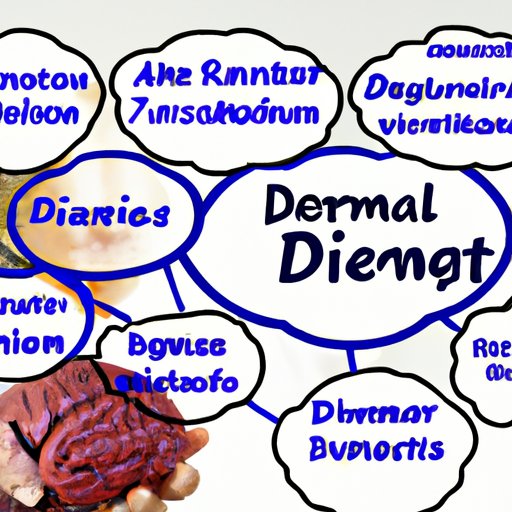Introduction
Dementia is an umbrella term used to describe a range of neurological conditions that cause cognitive decline. It is estimated that around 50 million people are living with dementia worldwide, and this number is expected to double by 2030. Although dementia is typically associated with aging, it can affect people of any age. Understanding the science behind dementia is essential in order to develop effective treatments and support those affected by the condition.
Exploring the Neurobiological Processes of Dementia
In order to understand the science behind dementia, it is important to examine how the brain changes with age. As we get older, our brains become less efficient at processing information, and this can lead to memory loss, difficulty concentrating, and other cognitive impairments. In addition, certain types of dementia, such as Alzheimer’s disease, involve changes in the structure and function of the brain.
Neurodegenerative diseases are also linked to dementia. These diseases cause neurons in the brain to die off, leading to cognitive decline. Common examples of neurodegenerative diseases include Parkinson’s disease, Huntington’s disease, and Creutzfeldt-Jakob disease. It is believed that these diseases can trigger the development of dementia.
Neurochemistry is another important factor to consider when exploring the science behind dementia. Certain neurotransmitters, such as acetylcholine and serotonin, play a critical role in cognition and memory. When levels of these neurotransmitters are low, cognitive impairment can result.
Examining the Genetics of Dementia
Genetic factors have been linked to certain types of dementia, such as Alzheimer’s disease. Scientists have identified a number of genetic variants that increase the risk of developing dementia. For example, the APOE4 gene has been linked to a higher risk of developing late-onset Alzheimer’s disease.
Family history is also an important factor to consider. If a close relative has dementia, then the risk of developing dementia is higher. This suggests that there may be a genetic component to the condition.

Investigating the Risk Factors Associated with Dementia
Environmental risk factors, such as exposure to toxins or head trauma, can increase the risk of developing dementia. Other medical conditions, such as high blood pressure, diabetes, and heart disease, can also increase the likelihood of developing dementia.

Understanding the Role of Diet and Exercise in Dementia
A healthy diet is essential for maintaining brain health. Studies have shown that diets high in fruits and vegetables, whole grains, and omega-3 fatty acids can help reduce the risk of dementia. Regular exercise is also important for maintaining cognitive function.
Research has suggested that physical activity can help improve cognitive function and reduce the risk of developing dementia. Exercise increases blood flow to the brain, which can help nourish and protect neurons from damage.

Analyzing Current Research on Treatments for Dementia
Despite the lack of a cure for dementia, there are some treatments available that can help manage the symptoms. Pharmaceutical therapies, such as cholinesterase inhibitors, can help slow the progression of cognitive decline. Alternative treatments, such as music therapy and massage, can also help manage the symptoms of dementia.
Conclusion
Dementia is a complex condition that affects millions of people around the world. This article has explored the science behind dementia, including the neurobiological processes, environmental and genetic factors, and potential treatments. Although there is currently no cure for dementia, understanding the science behind the condition can help us develop better treatments and support those affected by the condition.
It is clear that further research is needed on the causes and treatments of dementia. With more research, we can gain a better understanding of the condition and develop more effective treatments for those affected by it.
(Note: Is this article not meeting your expectations? Do you have knowledge or insights to share? Unlock new opportunities and expand your reach by joining our authors team. Click Registration to join us and share your expertise with our readers.)
